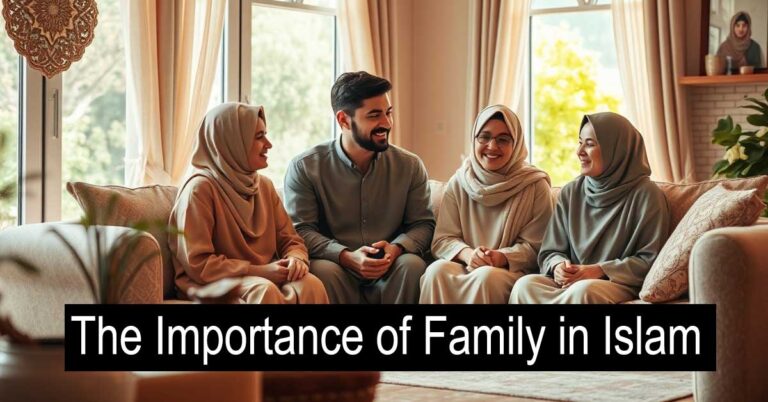The Role of Family in Islam: In Islam, family is not merely a social unit but a foundation for nurturing values, compassion, and stability. This article delves into the importance of family in Islam, exploring the spiritual and practical aspects of family life, and how maintaining a strong family bond leads to personal growth and societal harmony.
The Core Significance of Family in Islam
Islam places immense emphasis on family, viewing it as a means to develop a strong moral character and foster loving relationships. The family is seen as a place where faith, respect, and moral responsibilities are taught and upheld, shaping individuals who contribute positively to society.
Islamic Values in Family Life
Islamic teachings encourage maintaining a harmonious family life, where each member upholds their duties with care and sincerity. The family bond is strengthened through shared values such as mutual respect, patience, and understanding. Here are some core family values in Islam:
- Respect for Elders: Honoring and respecting parents and elders is essential. Their wisdom and guidance are considered invaluable for family stability and happiness.
- Kindness towards Children: Children are blessings and should be treated with kindness, patience, and love. Teaching them Islamic values from an early age builds a foundation for a positive future.
- Mutual Support and Responsibility: Islam advocates for mutual support among family members, fostering a spirit of teamwork, love, and responsibility.
Strengthening Family Bonds: Practical Tips
- Quality Time: Spending time together strengthens bonds and creates memories that enhance family unity.
- Communication: Open, honest, and respectful communication helps resolve conflicts and build understanding within the family.
- Forgiveness and Patience: Islam encourages forgiveness and patience, especially within the family, where understanding and tolerance lead to a harmonious environment.
Islamic Teachings and Hadiths on Family
The Prophet Muhammad (PBUH) emphasized the importance of family relationships in numerous Hadiths. One well-known Hadith states, “The best of you are those who are best to their families.” This underscores the value of kindness, respect, and caring actions toward one’s family members.
Conclusion: Embracing the Islamic Family Model
Family life in Islam is a source of comfort, security, and personal growth. By understanding and implementing these values, individuals can not only strengthen their family relationships but also contribute to a more compassionate and peaceful society. Let us embrace these values, fostering a home filled with love, respect, and faith.
FAQ
Why is family important in Islam?
Family is central in Islam as it provides love, security, and a foundation for nurturing faith and moral values, shaping well-rounded individuals.
What values does Islam emphasize for family life?
Islam promotes respect for elders, kindness toward children, mutual support, and open communication as essential family values.
How does Islam view the relationship between family members?
Islam encourages strong family bonds based on mutual respect, patience, and support, ensuring a positive and harmonious household.
Are there any Hadiths about family in Islam?
Yes, the Prophet Muhammad (PBUH) stated, “The best of you are those who are best to their families,” emphasizing the importance of kindness and respect within the family.
How can family relationships impact one’s spiritual growth?
Healthy family relationships provide emotional support and moral guidance, aiding personal and spiritual development as per Islamic teachings.
